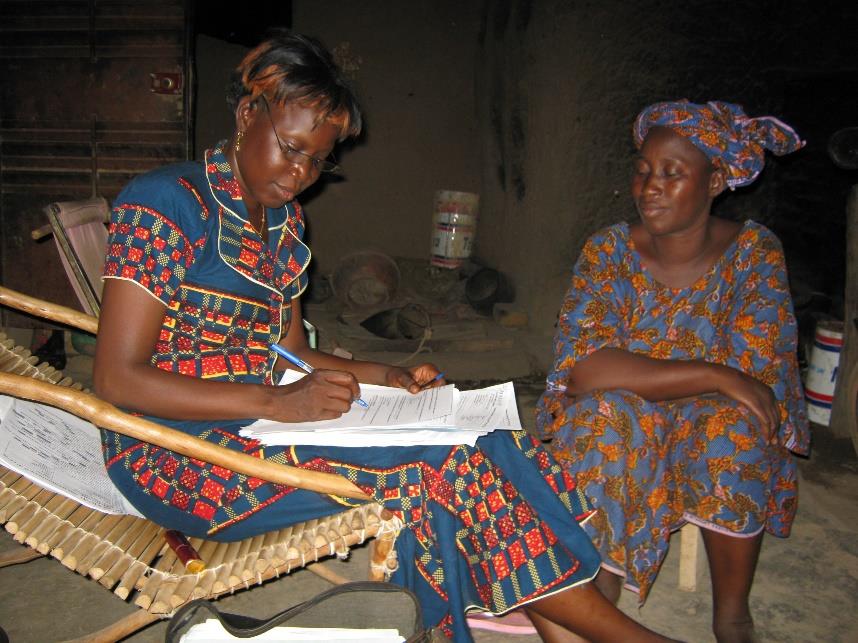It’s hard to keep girls in school in Burkina Faso. Even when parents recognize the value of educating their daughters, sometimes financial difficulties create insurmountable barriers to girls’ education. Such is the case for Koudpoko Ouedraogo’s family, who live in extreme poverty and vulnerability in Karma, Burkina Faso.
Before Koudpoko was selected to participate in Trickle Up’s program in their community, the family’s only income was their farm, on which Koudpoko, her husband, and their children worked. To pay for the children’s school, the family was often forced to find wage labor at nearby mines.
Koudpoko and her husband have three children, two of whom were enrolled in a middle school in Dingri, a nearby village 7 km from their home. This year, Bata started eighth grade, while her little brother Lallé began sixth grade. This was made possible by Koudpoko’s participation in Trickle Up’s program, which gave her a new source of income and savings to fall back on. Even so, the family’s resources were still limited and when finances became tight, Koudpoko’s husband quickly decided to pull their daughter from school. Lallé would continue his education, despite Koudpoko’s entreaties to keep them both in school. Because she is a girl, Bata will eventually get married and leave her community, while Lallé is more likely to continue his education and contribute to the family in the future – making him a better investment.
Koudpoko argued that they had the resources to afford their daughter’s education: as part of the Trickle Up program, she has access to savings and credit through her savings group and received a 50,000 CFA ($86) grant in January 2015 to start a new economic activity. She began to sell millet cakes and soaps and earned a monthly profit of 9,000-10,000 CFA ($15-17) during the first 9 months. In November 2015, Koudpoko did a scan of the marketplace and decided to focus on selling millet cakes, which are more lucrative. Now she brings in an average monthly profit of 17,000 CFA ($30). Investing money from her savings, she began a new livelihood activity raising animals and now has 2 sheep, 6 goats, and 15 chickens.
Nevertheless, her husband stood by his decision that their daughter would leave school and Koudpoko stepped aside, unable to influence the outcome. The disagreement created a divide between the couple and greatly upset Koudpoko.
She brought her problem to the savings group at their weekly meeting. Savings groups provide a safe space for women to share and discuss important issues, and seek the advice of their coaches. The other members of the savings group advised her to accept her husband’s choice or risk losing her home and family. In this cultural context, the head of the household always makes the final decision, even if a wife’s opinion is consulted. The group suggested that a process of discussion and negotiation may cause Koudpoko’s husband to reconsider his decision and they recommended that she speak to the coach, Mrs. Traore, who is trained on how to resolve a dispute like this and protect Bata’s education.
After understanding and analyzing Koudpoko’s situation, Mrs. Traore offered to involve the village president in order to find a solution. Several rounds of discussion ensued between the village president and Koudpoko’s husband. They began by stating the problem and attempting to ease the tension between Koudpoko and her husband, meanwhile ensuring Koudpoko would be able to continue participating in the savings group. They then held a special awareness session with the household members, stressing the importance of educating young girls. At this point, the subject had not yet been addressed with the larger savings group and community, but Mrs. Traore knew training on education was key to resolving this dispute.
The director of the primary school in the village, who was Bata’s teacher years ago, was alerted by the savings group of Bata’s situation. Not wanting Bata to be taken out of school, he went to the middle school in Dingri to talk to school officials. He convinced them to allow Bata’s parents to defer school payments for a few months and offered to act as the guarantor for her tuition. He knew that Koudpoko’s participation in the Trickle Up program would bring great benefits to her family, and he didn’t hesitate to vouch for her financially if it meant keeping Bata in school.
Following this, he was invited to join one of the savings group’s meetings to provide advice and information on how the government acts on issues regarding girls’ education. Koudpoko and Bata’s story was shared with the group as part of the awareness program on the importance of keeping children in school.
Just a few months after the start of classes, Bata was reinstated in eighth grade and the cost of tuition and school supplies (totaling 43,000 CFA or $74) were covered by Koudpoko’s income.
With her savings and some of the income from her husband’s work in the mines, Koudpoko was also able to provide a bike for Bata to get to and from school. Thanks to awareness and training on child protection, Mrs. Traore’s support, and the involvement of various local and administrative actors, the family’s cohesion was restored and both Bata and her brother are now able to stay in school.
Koudpoko Ouedraogo* of Karma, Burkina Faso
Girls’ education advocate, farmer, millet cake vendor



